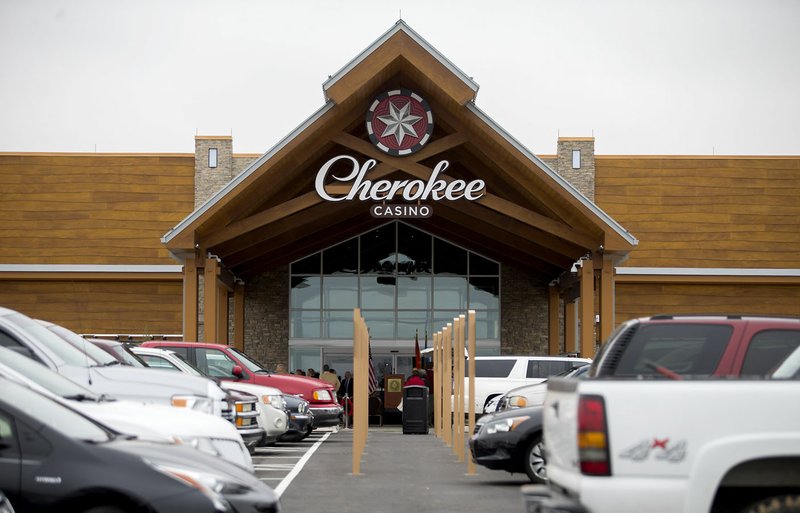SILOAM SRINGS -- Some Oklahoma tribal casinos have opened, while others have announced dates to unlock their doors, closed in March because of covid-19.
The Cherokee Nation rolled out its plan to open entertainment properties, but didn't say when.
Supreme Court ruling
In 1987, the Supreme Court confirmed the authority of tribal governments to establish gaming operations independent of state regulation. The following year, Congress passed the Indian Gaming Regulatory Act, which provided a regulatory framework.
Source: www.ok.gov
Cherokee casino locations near Arkansas' western border include West Siloam Springs, and Sallisaw and Roland near Fort Smith.
Cherokee Nation Businesses announced on May 18 "Responsible Hospitality," according to its website. The plan details virus protocols for casino gaming, food and beverage, hotel, retail, golf and live entertainment.
Cherokee Nation Businesses is owned by Cherokee Nation, the largest Native American tribe. The company operates 10 entertainment destinations in northeast Oklahoma, as well as a portfolio of nongaming businesses, employing 7,700 workers, according to its website.
The plan outlines procedures for physical distancing, enhanced cleaning and sanitation and noninvasive temperature screenings for employees and guests.
Additional measures include limited hours of operation, occupancy restrictions and the required use of masks by all. Guests are asked to bring their own mask, which covers the nose and mouth, but not the full face.
Food and beverages will be available, although buffets and banqueted events will remain temporarily suspended.
"I'm proud of CNB's leadership team for prioritizing the health and safety of our business employees and customers," Chuck Hoskin Jr., principal chief of the nation, said in the release. "Cherokee Nation's response to the covid-19 pandemic has set a high standard and this phased reopening plan is an extension of that standard."
West Siloam Springs Mayor Elaine Carr noticed one big difference when the Cherokee Casino on U.S. 412 closed in March.
"There is no traffic," she said. "We're on scenic 412. A lot of revenue passes through. We will be glad to see them open again."
The Indigo Sky Casino opened Thursday, according to its website. The casino's safety response plan notes every other gaming machine will be turned off or the chair removed. Once a machine is vacant, casino staff will clean it. Staff members who work in direct guest-service areas will wear face masks. All food and beverage venues will have new seating configurations that meet the 6-foot social distancing guidelines.
The Eastern Shawnee Tribe of Oklahoma operates Indigo Sky Casino in Wyandotte, Okla.
Downstream Casino Resort in Quapaw opened Thursday, according to information on its website. Downstream is about 7 miles west of Joplin, Mo., and owned and operated by the Quapaw Nation of Oklahoma.
Grand Lake Casino in Grove also opened Thursday, according to its website The lodge will remain closed. The Seneca-Cayuga Tribe of Oklahoma operates the casino.
The Choctaw Nation of Oklahoma announced all Choctaw casino locations plan to resume operations June 1 with increased health and safety measures. There's a Choctaw Casino and Resorts in Pocola, Okla., south of Fort Smith.
River Bend Casino and Hotel in Wyandotte will open June 1, according to its Facebook page. The Lucky Turtle casino, also in Wynadotte, will remain closed, said William Swaim, communication specialist with the Wyandotte Nation, which owns the casinos.
Safeguards in place at River Bend will include 30% occupancy limits on the casino floor and Twin Bridges restaurant and the deli, and 50% occupancy for the hotel, according to information provided by Wyandotte Nation.
Under compacts with the state, tribes pay monthly exclusivity fees based on a sliding scale for Class III electronic games. For the first $10 million in revenue, tribes pay 4% to the state; for the next $10 million, the payment is 5%; and for revenue more than $20 million, the payment is 6%.
Tribes pay 10% of the monthly net win from table games, according to the 2018 Oklahoma Gaming Compliance Unit's annual report.
As required by statute, the exclusivity fees go to the Education Reform Revolving Fund, the General Revenue Fund and the Department of Mental Health and Substance Abuse Services.
Carr said the Cherokee Nation helps out in various ways in the community. She said the tribe helps pay for police and ambulance service.
"They do many things that people don't realize like helping with food and back-to-school drives," she said.
NW News on 05/25/2020

